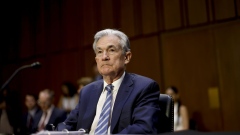Aug 2, 2019
Boris Johnson's no-deal Brexit might become a side-deal Brexit
, Bloomberg News
Johnson Doubles Spending on U.K.'s No-Deal Brexit Preparation
Boris Johnson is playing the part of the “madman” negotiator to a tee. The new British prime minister insists he will take his country out of the European Union on Oct. 31 with either a completely new withdrawal deal or none at all – however high the economic cost. With Johnson refusing to even meet his EU counterparts until they agree to his terms, it has fallen to his Brexit adviser David Frost to transmit his message to Brussels. He says people should be in “no doubt” that Johnson’s no-deal threats are real.
At first glance this seems like a strategy destined to get nowhere. The U.K. parliament is divided, Johnson’s working majority is wafer-thin, and his brinkmanship is battering the pound. This is hardly solid ground from which to launch a frontal assault on the 27 other member states.
France’s Europe minister Amelie de Montchalin has ruled out a new deal, while the German foreign minister Heiko Maas says the bitterly contentious Irish “backstop” clause (which guarantees a soft border between Ireland and Northern Ireland) is necessary and not in anyone’s interest to drop – despite Johnson’s insistence that it be scrapped.
Nonetheless, the EU’s so far impressively unified position on Brexit is going to be tested thoroughly by Johnson’s deliberate ramping up of no-deal tensions. This is not Brexiter propaganda: The economic impact of Britain departing without agreement radiates out from the U.K. like a heat map, with western Europe far more affected than the rest of the bloc. According to the Bertelsmann Stiftung think tank, it will mean an estimated 3.4 billion euro (US$3.8 billion) hit to direct neighbor Ireland, 7.7 billion euros to nearby France and 3.2 billion euros to the Dutch. But for faraway Slovenia, it’s a hit of barely 100 million euros. Not all states are equally exposed.
- Pound gets slammed on rising fears of a no-deal Brexit
- Boris Johnson Is Playing With Fire on the Pound
- EU says no to Boris Johnson, increasing no-deal Brexit risk
RELATED: BREXIT
This will resurrect the time-honoured British tradition of divide and conquer. The Brexit minister Stephen Barclay told a parliamentary committee last month that he saw the “asymmetric” impact of a no-deal scenario as a bargaining chip to squeeze concessions out of those most exposed to the chaos.
There’s little chance of the EU caving in on positions that matter to all of its members: The 39 billion-pound (US$47 billion) divorce payment being demanded from the U.K., peace in Ireland, and EU citizens’ rights in Britain. But there’s still scope for some bilateral arm-twisting. According to reporters at HuffPost, Barclay is drawing up a hit-list of countries – France, Belgium, the Netherlands – that are potentially tempted by trade side-deals for particular business sectors.
The British strategy hasn’t worked before. But we’re now three years on from the referendum, the deal backed by the EU has been rejected several times by U.K. lawmakers, and the euro zone economy is slowing. The shock of no-deal is the last thing Europe’s capitals want and Johnson is playing ruthlessly (some would say recklessly) on this fear.
France’s president Emmanuel Macron may have taken a hard line on the Brits in public, but he said back in January that he would do everything to defend the right of French shipping fleets to fish in U.K. waters in a no-deal scenario. The prospect of a fresh round of “scallop wars,” or another customs strike that paralyzes the Eurostar, might tempt Paris into offering London some trade carve-outs in exchange for concessions.
This is an ugly prospect for the EU’s Brexit negotiators, led by Michel Barnier. Ideally he would want Macron and Germany’s Angela Merkel to stick together and shut down any attempts at side-deals as a threat to the single market. The message from Brussels is that a hard Brexit will split the U.K. (with the Scots and Northern Irish opposed), not the EU. The European side will hope that its own preparations for no deal, such as sending more funds to key ports and industries, will provide enough economic stimulus to dim the appeal of sweetheart deals with Johnson.
The closer we get to the no-deal precipice, though, the more business lobbyists will start shouting for special treatment. The U.K.’s Confederation of British Industry has already accused the EU of not preparing enough for a hard exit on Halloween, even though the French and Germans have granted exemptions for parts of the financial industry to carry on orderly trading. How long before Germany’s mighty carmakers, or France’s farmers, ask for some of their own? For the sake of the EU’s future it will be better to turn them down. But with so many jobs at stake it’ll take a brave politician to do so.



